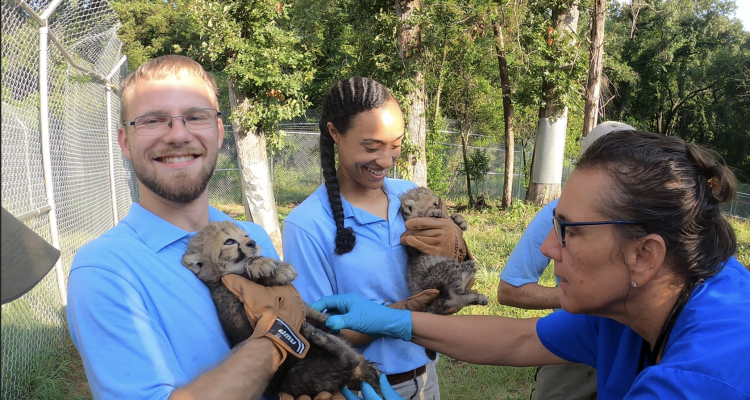Paul Swen
He paces anxiously, back and forth. He can sense her presence. When the door opens, he immediately steps into the passageway and makes his way along the pathway towards her quarters. When he turns the corner, her door is open, and he enters. He finds her standing alone, regal and graceful. He approaches carefully. Suddenly she turns, snarls and swats him across the face. Obviously, he’s shocked and disappointed. Reluctantly, Junya, a mature, male cheetah, is forced to retreat. Considering the eccentricities of these imposing cats, you can imagine that it’s not easy to be cheetah matchmaker.
For months the Mammals Keepers at the Caldwell Zoo have been showing their sincere dedication for wildlife by trying to successfully find an acceptable mate for the very particular female, Orchid. Cheetahs are naturally shy and have very exacting standards. Everything has to be just perfect. The team at the Caldwell Zoo has years of expertise with cheetahs, but it still isn’t simple. As a member of the Cheetah Breeding Coalition, the Caldwell Zoo team is committed to doing all they can to help the long-term survival of African cheetah. These beautiful and magnificent felines have become endangered in the wild. So, the Caldwell Zoo has joined forces with other accredited zoos to responsibly breed cheetahs and protect the future of the species. Through the Save Animals From Extinction (SAFE) program of the Association of Zoos and Aquariums (AZA), the coalition receives suggestions for breeding, based on genetic records. The female Orchid was brought to Tyler from the White Oak Conservation Center to be introduced to two males, Junya and Flap, from The Cincinnati Zoo. It’s a delicate process.
“It takes a lot of careful study and preparation,” explains Candace, a member of the Mammals Team. “First, we have to provide the perfect habitat. It needs to be spacious, quiet and tranquil. Then we look for signs that the female, is ready to breed. She may use different vocalizations or flick her tail. It can be subtle. If the signs look right, we carefully introduce the males. For cheetahs, the females choose their mate. So, it’s completely up to her.
We introduced the males, Junya and Flap, to her, and honestly, Orchid was not impressed.
At first, it appeared that Orchid wasn’t quite sure what to do. She showed all the signs but rejected all advances. Then, one day, things changed, Orchid accepted Flap, and the couple mated. But that is just the beginning. The team had to determine whether Orchid was actually pregnant, and the pregnancy needed to run its full course. Thanks to expert training of the keeper team, they were able to confirm the pregnancy via a voluntary ultrasound after twenty days, (the earliest they have ever been able to confirm a cheetah pregnancy). Then, at the sixty-day mark, the team was able to get an X-ray showing that Orchid was carrying three cubs.
Kara, another Mammal Keeper, shared some insight. “We had worked for months with Orchid to get her completely comfortable with the medical equipment and the process. So, getting the ultrasound and x-ray images went really smooth. That was great. We knew we had three cubs. Then we had to hope everything else went well.”
Birthing always has its challenges and Orchid would be a first-time mother. A lot can go wrong. Cheetahs in the wild can lose or abandon their cubs due to anxiety, lack of proper nutrition, or even just the absence of motherly instinct. To increase the chance of success, the zoo team prepared everything to be just right for the expecting mother. Orchid received extra food to provide for the cubs along with some preventative medicine. Her habitat included custom-built dens to give her safe and comfortable options for delivery. Of course, privacy was mandatory, and the team used remote cameras to monitor Orchid to make sure she was content and at ease.
“Then she skipped breakfast. That was a crucial sign that the big moment was coming,” team member Ricki shares. “We knew the approximate due date, of course. But when a cheetah skips a meal, we knew that she was close to giving birth. Sure enough, that evening, Orchid successfully delivered three precious cubs. And best of all, she was immediately an attentive and caring mother!”
This is a big deal. Every cub counts. Considering the stark decline of cheetah in their native homelands, adding to the managed population in a responsible manner is a key to the survival of the species. Recently, there have been substantial global efforts to reintroduce domestically bred cheetah back into the wild. It takes a team of experts to make this possible. Steve Marshall, President and CEO of the Caldwell Zoo explains, “We want to do all we can to help endangered species. That is a critical aspect of our mission. I am so very proud of our team for the incredible work they do every day. I’m also extremely thankful for the support we have received from our community. Helping wildlife is what we’re all about. And just wait until you lay your eyes on these adorable cubs. They will melt your heart.”


